 MyDogBreeds
MyDogBreedsGull Terr is originated from Pakistan but Bullenbeisser is originated from Germany. Both Gull Terr and Bullenbeisser are having almost same height. Gull Terr may weigh 11 kg / 25 pounds more than Bullenbeisser. Both Gull Terr and Bullenbeisser has same life span. Gull Terr may have less litter size than Bullenbeisser. Both Gull Terr and Bullenbeisser requires Low maintenance.
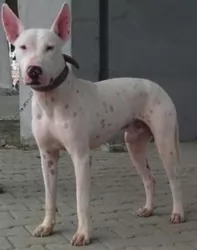 The Gull Terr hails from Pakistan. Having been introduced to the country by the British Raj, the dog has always been valued for its guarding and fighting abilities.
The Gull Terr hails from Pakistan. Having been introduced to the country by the British Raj, the dog has always been valued for its guarding and fighting abilities.
The British army, on bringing English Bull Terriers with them, mated them with local dogs. The dog was in other words, created from the old bull terrier which became extinct, and the Bully Kutta.
The Gull Terr or Pakistani Bull Terrier as he is known is a rare breed of dog. Today they are usually found in rural areas of Pakistan as well as in the Indian Panjab area, becoming popular as both pet and watchdog. It is no longer used for dog fighting as this has been banned.
Known also as the German Bulldog, the Bullenbeisser was a strong dog which is now unfortunately extinct. There were two regional types – the Brabanter- and the Danziger Bullenbeisser.This Molosser-type dog was native to Germany and was bred for different hunting purposes.
Nobody is quite sure what dogs are included in Molossers, but they are essentially large dogs bred to hunting and rescue, tending to have a shorter muzzle. The Bullenbeisser is famous for the role the dog has played in the development of the wonderful dog we have today, the Boxer. In fact, some Bullenbeissers were crossed by the Boxer Kennel Club of Germany with Bulldogs from the UK.
Not much is known about the history of the Bullenbeisser, but the breed also has a history in the lands of the Holy Roman Empire. The dog was at first a type of Mastiff, large and with the typical brachycephalic head, and used for hunting because of their power.
To improve their dogs, many Bullenbeisser breeders began crossing their dogs with English Bulldogs, introducing a white coat to the Bullenbeisser. Other breeds were also crossed with the dog such as the Bull Terrier, but by the end of the 19th century, the traditional Bullenbeisser was slowly dying out. It was in the late 1870s that German breeders, Hopner, Konig and Roberth used the dog to bring about a new breed, which today is known as the Boxer.
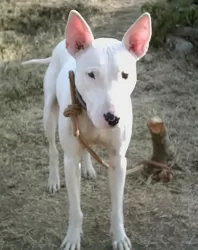 As a medium sized dog, the muscled Gull Terr stands as 45 – 66cm in height and weighs in the area of 40 – 45kg.
As a medium sized dog, the muscled Gull Terr stands as 45 – 66cm in height and weighs in the area of 40 – 45kg.
The dog has a short, smooth coat which is white, but you may find some black spots on him. He has a egg shaped head, ears are naturally erect, dark slanted eyes, and he has a long tail which is held upwards. Muscled and agile, he is a powerful working breed and makes a good watchdog.
This is an aggressive dog breed, and first-time dog owners might want to have a more amicable kind of pet to start off with.
He is a fearless dog, somewhat aggressive and suspicious towards strangers and therefore wants to protect his owner from them. With training and socialization he can be good with children in the home, although he is inclined to be boisterous and stubborn. He has fierce protective instincts, even though he is considered not as aggressive as some other Pakistani dog breeds.
The Gull Terr will need an experienced dog handler. Even though he has been a fighter in his day, he is capable of being an excellent family pet as well. You won't have trouble training him as he is intelligent. He then becomes more obedient and more manageable. He is a very active dog and therefore he won't fit into city dwelling where there are small spaces. He needs a place to run and on top of that he will require a good deal of exercise.
The Boxers lineage comes from the Bullenbeisser. The Bullenbeisser was a fierce, courageous dog, noted for its hunting abilities. The dog was developed into the Boxer so that its body become more defined and more streamlined.
Described as a medium to large muscular dog, standing roughly 63cm in height, he would have weighed in the region of 32kg. He had a short coat, brown eyes and short to medium ears which were half erect, half floppy.
Brown to fawn in color, he had a long tail which was later docked to give the dog a more distinctive, attractive look. The dog also got its attractive fawn color from the English Bulldog. Loyal, active and loving, the Bullenbeisser was a true family dog with a close affinity to children.
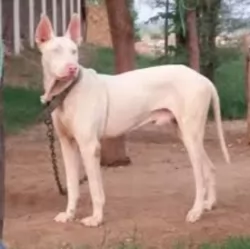 Your Gull Terr love the attention he receives from his human family and he won’t flourish at all if he is put into the back yard for watch dog purposes only. He is a dog that needs to come indoors to be with his family.
Your Gull Terr love the attention he receives from his human family and he won’t flourish at all if he is put into the back yard for watch dog purposes only. He is a dog that needs to come indoors to be with his family.
He tends to be somewhat aggressive and this is why he isn’t looked upon as the ideal pet for first-time dog owners and those with young children in the home.
He is a confrontational dog, willing to enter into a fight with provocation. Strong willed he will require early training and socialization, and when he is brought up by a firm, consistent, kind owner, he can get over his aggression and become a loyal, devoted, protective and loving pet.
Information on the extinct Bullenbeisser is limited, but because he was used to bring about the Boxer you can be sure that he would have been fearless, courageous and territorial of his property and of his human family.
The Bullenbeisser would have been a good watch-dog and with the right kind of loving care, a most awesome and loving family companion.
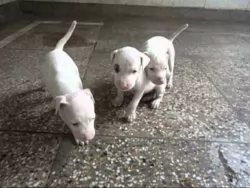 The Gull Terr has a deep chest and this means he is more prone to bloat, a condition known as gastric dilation volvulus.
The Gull Terr has a deep chest and this means he is more prone to bloat, a condition known as gastric dilation volvulus.
Your pet's stomach fills with air and this leads to decreased blood flow to vital organs. The stomach can twist and this is when the condition becomes life threatening as blood supply to the stomach is cut off. Instead of feeding him large meals, feed him smaller meals more frequently.
Deafness in your pet can be temporary or permanent, in one ear or both. There are are so many reasons why your pet could be deaf and it could be a birth defect, an infection or old age. Certain dogs such as the white coated Gull Terr are also more predisposed to congenital deafness.
Get him to the vet who will examine your dog’s ear canal for wax and debris and discuss the way to go for your beloved pet.
In general, medium to large breeds like the Bullenbeisser have a lifespan of 10, 11 or 12 years. The life expectancy of these dogs relied much on the lifestyle they led and their diets.
The Bullenbeisser had a deep chest and this made dogs like this prone to gastric dilatation and bloat which can be life-threatening and which requires immediate veterinary intervention. The dog with this disease has distension of the abdomen and extreme discomfort, wanting to vomit but being unable to do so.
Hip Dysplasia is a disease which is more common in larger dogs and is an abnormal formation of the hip socket, resulting in lameness accompanied by painful arthritis.
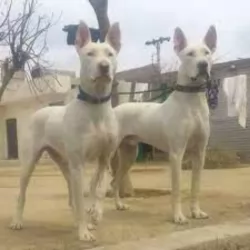 Easy to look after with his short coat, the Gull Terr will only require a brushing twice a week to keep the coat shiny and healthy.
Easy to look after with his short coat, the Gull Terr will only require a brushing twice a week to keep the coat shiny and healthy.
Because his coat is white, it can show dirt easily, and it will simply require taking a damp cloth and wiping the mark off him. You don't want to be bathing him often as this dries his skin out – rather just wipe the coat down.
Your Gull Terr is a highly energetic dog and he loves nothing more than to be involved in robust exercise and games. He is best suited in a home with large grounds and if you do opt to have him in the city, you will have to pay close attention to his exercise needs – lots of walks, runs, ball games, swimming and running with you as you cycle.
You want to be sure that your energetic Gull Terr has a healthy diet full of important proteins, fats, and carbohydrates.
Protein is always important for a dog like this and you want to make absolutely sure that apart from his high quality kibble, you mix in raw meat from time to time as well as cooked chicken, fish, brown rice and vegetables.
When looking for a commercially manufactured dog food, look for high-quality animal protein as a top ingredient. Make sure he always has fresh, cool water available to him.
The Bullenbeisser was a mastiff like breed with a short, easy-to-care for coat. He would have required a good brushing down at least twice a week to remove the coat from loose hairs. As an active, outdoor-type dog, he would have had to have his ears checked for dirt and the possibility of infection.
Although the Bullenbeisser was a hunting dog, he no doubt led an active outdoor lifestyle. Dogs such as the Boxer and the Mastiff, which are descendants of this dog are the kind of dogs which will need to be exercised regularly, taken on walks and given lots of running games with a ball.
As a medium to larger breed with lots of energy, the Bullenbeisser would have no doubt had home-made food from his master’s table. This food would have included meat and vegetables. As a hunting dog he would have had the chance to get in some raw meat which is imperative for the health of any domesticated dog today.